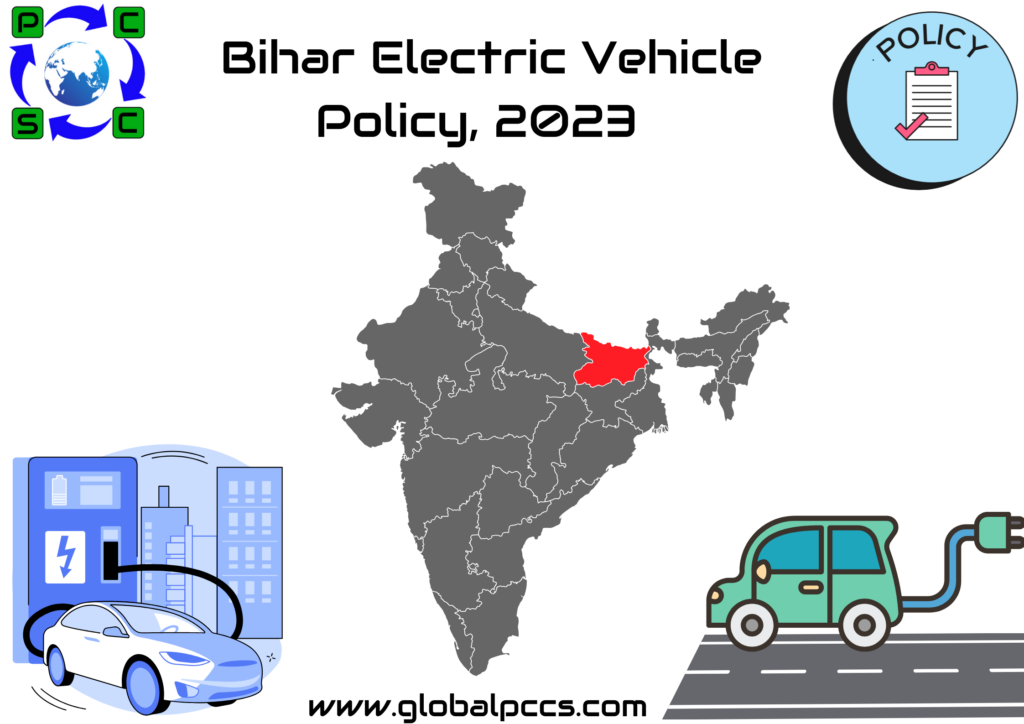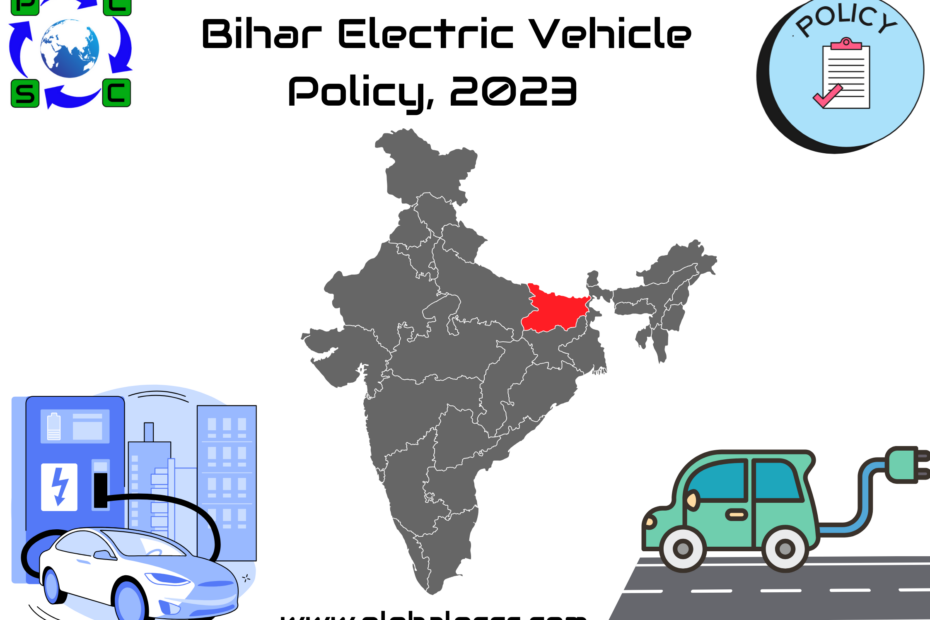 Introduction
Introduction
The shift to electric mobility is a promising global strategy due to fossil fuel depletion, rising fuel costs, and environmental pollution. Adopting electric vehicle (EV) technology offers numerous benefits, including eco-friendliness, improved air quality, reduced GHG emissions, noise reduction, reduced recurrent costs, and increased public safety.
Electric Vehicles are considered to be safer than their Internal Combustion Engine (ICE) counterparts because of:
- Low centre of gravity due to lesser height and density of the battery pack.
- Increased frontal crumple zone as electric motors take much less space than ICEs.
The Government of India aims to support the global EV30@30 campaign by achieving the objective of at least 30% electric vehicle sales in total new vehicles by 2030. The State Government of Bihar has developed the “Bihar Electric Vehicle Policy, 2023” to promote electric vehicles and charging stations in response to recent technological advancements in the EV sector and the enthusiastic adoption of electric vehicles by citizens. The policy will be in effect for 5 years from the notification date.
Mission:- To drive a longer sustainable transport ecosystem with a focus on ensuring maximum availability of electric vehicles in Bihar by 2028.
Goals and Objectives:-
- To ensure that 15% of the new vehicles purchased and registered in Bihar are electric vehicles by 2028.
- To make Bihar a model state for developing an Electric Vehicle transport ecosystem.
- To develop an accessible and robust network of EV charging infrastructure in the state.
- To encourage startups and investment in the field of electric mobility and associated support sectors like data analytics, IT, R&D, etc.
- To improve the quality of the environment by reducing air pollution.
Scope and Eligibility
- Bihar EV Policy, 2023 shall remain effective for a period of 5 years from the date of publication of its notification in the Bihar Gazette.
- The fiscal incentives being offered under the policy would be in addition to the demand incentives available in the FAME-II(Faster Adoption and Manufacturing of (Hybrid and) Electric Vehicles) scheme of the Government of India and any amendments thereafter.
- The incentives for setting up a charging station shall apply to those charging stations that are established in compliance with existing guidelines and standards of the Ministry of Power, Government of India.
- The Industry Department, Government of Bihar has incorporated EV manufacturing and related activities in high priority sector of Bihar Industrial Investment Promotion Policy, 2016 notified vide notification no-1937 date 27.12.2017
Incentives For Early Adoption of Electric Vehicles
- Electric Two-Wheelers
- Purchase incentive of Rs. 5,000/- per KWH for electric two-wheelers purchased and registered in Bihar, up to a maximum of first 10,000 electric two-wheelers, with an upper limit of Rs. 10,000/- per vehicle for SC/ST and a maximum of Rs. 7500/-per vehicle for others during the policy period.
- 75% rebate in Motor Vehicle Tax, for the first 10,000 electric two-wheelers purchased and registered in Bihar or within the policy period whichever is earlier.
- After 10,000 electric two-wheelers, subsequent electric two-wheelers purchased and registered in Bihar will get a 50% rebate on Motor Vehicle Tax, till the policy remains in force.
- Electric Three-wheeler (Passenger Vehicle) (Goods Carriage), Light Electric Motor Vehicle (Goods Carriage)
- 50% rebate in Motor Vehicle Tax shall be provided to electric three-wheelers (passenger vehicles, goods carriage) purchased and registered in Bihar during the policy period.
- All new registered electric three-wheelers (passenger vehicles, goods carriage) purchased and registered in Bihar shall be given due exemption in permit fee during the policy period in light of the provisions of MoRTH.
- Electric Four-wheeler
- Purchase incentive of Rs. 10,000/- per KWH for electric four-wheelers purchased and registered in Bihar, up to a maximum of first 1000 electric four-wheelers with an upper limit of Rs. 1,50,000/- per vehicle for SC/ST and a maximum of Rs. 1,25,000/- for others during the policy period.
- 75% rebate in Motor Vehicle Tax, for the first 1000 electric four-wheelers purchased and registered in Bihar or within the policy period, whichever is earlier.
- After 1,000 electric four-wheelers, subsequent electric four-wheelers purchased and registered in Bihar will get a 50% rebate on Motor Vehicle Tax, till the policy remains in force.
- Heavy Electric Motor Vehicle (Bus and Goods Carriage)
- 75% rebate in Motor Vehicle Tax, shall be provided to heavy electric motor vehicles (bus and goods carriage) purchased and registered in Bihar for the first two years during the policy period from the date of notification.
- After two years, all subsequent heavy electric motor vehicles (bus and goods carriage), purchased and registered in Bihar, will get a 50% rebate on Motor Vehicle Tax, till the policy remains in force.
- All heavy electric motor vehicles (bus and goods carriage) purchased and registered in Bihar shall be given due exemption in permit fee during the policy period in light of the provisions of MoRTH.
- Common Provisions for All Categories of Vehicles
- Owners of electric vehicles purchased and registered in Bihar shall also be eligible for scrapping incentives for old vehicles as per notification issued by MoRTH for this purpose from time to time.
- The incentive for all categories of electric vehicles purchased and registered in Bihar as mentioned above shall apply to the electric vehicles complying with the Technology Definition of each category of electric vehicles under the FAME India scheme.
- Public parking: – Municipal authorities will provide subsidised parking for all personal EVs. Individual Towns/Cities will prepare a city parking plan providing for on-street parking places for electric vehicles with subsidised fees and EV charging stations.
- The beneficiary shall not be liable to claim more than one similar incentive under any other scheme run by the State Government.
Charging Station Infrastructure
Category of Chargers and Incentives:- EV adoption depends on charging facilities. The primary goal of this policy is to provide accessible EV charging stations in Bihar. Given this, the government is going to create a network of private and public charging stations around the state. For three years, incentives will be available for all charging stations.
As per Ministry of Power, Government of India guidelines, the following categories of chargers can be set up in various charging stations and for this, the category-wise incentive will be as follows: –
Category- 1: Electric Vehicle- AC charger (three Guns)Slow/Moderate Charger:-
- Incentive: 75% on purchase of equipment/machinery and Rs 10,000 as installation cost (excluding the cost of land) per charger, subject to a maximum of Rs 50,000/- for the first 600 chargers.
Category-2: Electric Vehicle- AC charger (two guns)Fast Charger:-
- Incentive: 75% on the purchase of equipment/ machinery and Rs 25,000/- as installation cost (excluding the cost of land) per charger, subject to a maximum of Rs.1,50,000/- for the first 300 chargers.
Category- 3: Electric Vehicle- DC charger (two guns)Slow/Moderate:-
- Incentive: 75% on the purchase of equipment/machinery and Rs.25,000/- as installation cost (excluding the cost of land) per charger, subject to a maximum of Rs.1,50,000/- for the first 300 chargers.
Category-4: CCS/CHAdeMO Charger (two guns) Fast charger:-
- Incentive: 50% on the purchase of equipment/machinery and Rs. 1,00,000/- for installation cost (excluding the cost of land) per charger, subject to a maximum of Rs. 10,00,000/- for the first 60 chargers.
Operational Model
- Private Charging Station:- Charging Stations established for private use by Residential Building Owners/Residential Welfare Associations (RWAs)/Co-operative Housing Societies. All existing residential building owners, Residential Welfare Associations (RWAs) and Co-operative Housing Societies with demarcated parking areas of at least 5 equivalent car spaces (ECS) will be encouraged to install at least one Bharat Electric Vehicle AC charger (3-Guns). The Department will provide incentives for the installation of such charging stations as per the category-1 charger mentioned in para-8.
- Semi-Public Charging Station:- Charging Stations established for both private and commercial use by non-residential building owners. All non-residential building owners and market associations having parking areas demarcated for at least 5 equivalent car spaces (ECS) and 5 equivalent bike spaces will be encouraged to install at least one Bharat EV AC charger (3-Guns). The Department will provide incentives for the installation of such charging stations as per the incentive mentioned in para-8. Incentives shall also be provided for another category of charger installed at these locations as per the conditions and categories mentioned in para-8. However, incentives shall be provided for a maximum of 5 EV chargers at a specific location.
- Public Charging Station (PCS):- Charging stations established for commercial use only. These may be established on Government land as well as on private land. In Bihar, the public charging station shall be established at the following locations:-
- PCS on Government Land Established, Owned and Operated by Government Entity.
- PCS on Government Land Established and Operated by Private Entity.
- PCS Established on Private Land.
- Common Provisions Across All Charging Stations
- All EV charging stations, to comply with the Ministry of Power, Government of India circular dated 14.01.2022, and any amendments or provisions thereafter.
- Establishment of PCS, their location and distribution shall also be as per the Ministry of Power, Government of India circular dated 14.01.2022 and any amendments thereafter.
- All housing and commercial establishments shall give a ‘No Objection Certificate’ (NOC) to its members who wish to install a charging station with the designated parking space.
- Petrol pumps can also set up charging stations subject to complying with fire and safety standard norms of relevant authorities under relevant Acts/Rules.
- The incentive shall only be given to those persons and entities not availing subsidies for charging stations under any other scheme of the Government of Bihar.
- Incentives shall be available only for those chargers that comply with Bharat EV Charger (BEVC-AC001 and BEVC- DC001) specifications.
Recycling Ecosystem – Battery and Electric Vehicle
- EV batteries typically need to be replaced once they have degraded to operating at 70-80 % of their capacities. The age of EVs is more than the batteries powering them, therefore EVs are required to change their batteries twice in a 10-year life span.
- Batteries that have reached their end of life will need to be either reused or recycled. Lack of proper reuse or recycling will have a serious environmental effect. Not only do EV batteries carry a risk of releasing toxic gases during disposal, but their core materials such as lithium and cobalt are available in limited amounts and very expensive to extract.
- Re-use of EV batteries reaching their end of life will be encouraged and setting up of recycling businesses shall also be promoted in collaboration with battery and EV manufacturers with focus on extracting rare metals from within the battery and re-use of batteries.
- A well-defined Policy for encouraging re-use of batteries shall be notified by the Industries Department, Government of Bihar in consultation with the Environment, Forest &Climate Change Department, Government of Bihar and Bihar State Pollution Control Board.
Policy Implementation
3-tier arrangement for directives, monitoring and implementation of the Bihar State Electric Vehicle Policy:-
- State Level EV Steering Committee
- EV Monitoring Committee, Transport Department
- District Level EV Committee
Conclusion:- Where the Electric vehicles use electricity to charge their batteries instead of using fossil fuels like petrol or diesel. And are more efficient, and that combined with the electricity cost means that charging an electric vehicle is cheaper than filling petrol or diesel. Using renewable energy sources can make the use of electric vehicles more eco-friendly. The electricity cost can be reduced further if charging is done with the help of renewable energy sources installed at home, such as solar panels.








 Authorised IMDS & CDX Training & Consulting partner for
Authorised IMDS & CDX Training & Consulting partner for






